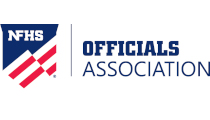Coaches and Officials: On the Same Side of the Spectrum?
By Dana M. Pappas on November 21, 2017 officials Print
Cats and dogs. Mars and Venus. Fire and ice. Oil and water. Day and night. Everywhere we look, we see opposites. In the interscholastic athletic arena, the most glaring example of polar opposites is… coaches and officials.
But, are we really that different?
On the surface, it is easy to look at coaches and officials and immediately notice some contrasts and comparisons. The coach is on the sideline, on the bench, in the corner of the mat, in the dugout. The official is on the field, on the court, in the center of the action. The coach is wearing a suit or school polo or a uniform or warm-ups. The official is wearing stripes, or a brightly colored soccer jersey, or a white polo shirt, or plate gear. The coach has the clipboard. The official has the whistle.
So many of those differences are superficial and some are dictated by the rules and mechanics of the game. When you strip down a coach or an official - when you take away the stripes, the whistle, the clipboard and where they stand on the playing field - you really have the same person.
Wait…what?
On October 20-21, 2017, the New Mexico Activities Association, New Mexico High School Coaches Association and New Mexico Officials Association did something crazy. The three associations got together with coaches and officials in basketball and wrestling and had a combined symposium. Over 300 coaches and officials in two sports under the same roof and the results were simply outstanding.
Through combined sessions (a combination of classroom and on-court/on-the-mat) with the two parties, coaches and officials were able to ask each other questions, to learn from one another and to be under the same roof in a non-adversarial setting, like when the ball goes up or when the first match starts at a wrestling tournament. When you saw them, all walking down the halls at the host hotel or in combined sessions together, you would not know by looking at them if they were coaches or officials. They just looked like a bunch of people who love high school sports.
All too often, coaches and officials are at odds with one another. My question is - why? We all understand there is something inherent to the coach-official battle in the professional and even collegiate ranks, but should there be at our level? Should the sanctity of high school sports be tainted with the toe-to-toe, face-to-face, demonstrative arguments you see on television? Absolutely not!
Look at all of the beautiful similarities between high school coaches and high school officials:
- They love sports.
- They are giving back to their communities and to the student-athletes in their schools.
- They are educators in an extension of the classroom.
- They are both, in many circumstances, seeing small paychecks but large rewards.
- They both sacrifice countless hours away from their families, “real jobs,” friends and hobbies to provide a community service to kids.
- They both take work home with them every night.
- They are both human beings, who make mistakes, who are lifelong learners of athletics and who want to stay involved with something that gave them a great deal as kids.
All the important attributes of coaches and officials are the same. It is only the superficial qualities that are different. The pressure that coaches and officials feel is also different. Coaches feel the pressure from everyone to win. They feel pressure from parents to give their kids playing time. They feel pressure from their kids at times to be role models and sometimes parent figures. They feel pressure from their families who don’t get to see them enough. They feel it from themselves.
Officials feel pressure too. They feel it from assignors and evaluators. They feel it from the thousands of fans who are helping them officiate from the stands. They feel it from their crews. They also feel it from their families who are dealing with absentee spouses, fathers and mothers. They feel it from themselves as well.
Even in pressure and stress, the two parties have similarities. Coaches and officials are competitive with themselves and with each other. The worst critic of every coach and every official himself or herself. Coaches and officials beat themselves up over what they could have done better in a game. Coaches look back at a game and realize how they could have adjusted through better play calling and substitutions. Officials look back at a game and realize how they could have gotten the call right through better positioning and rules knowledge. They both end up beating themselves up for a night and then turning the page to do it all over again tomorrow.
During the symposium, we assembled a panel of two basketball coaches and two basketball referees to discuss what each “side” expects of the other. Coaches stated that they want officials who are well-conditioned, who are professional, who know the rules, who are respectful and who will occasionally let them vent. Officials stated that they want coaches who are professional and respectful. Even in expectations, the two parties were similar.
Coaches and officials all have a job to do and, as one New Mexico legendary coach said it best at the symposium: “Let the coaches coach, the players play and the officials officiate. I became a much better coach when I stopped worrying so much about officials.” If we all worry about our own “jobs,” the game will go much more smoothly for the people who bring us to the profession or avocation in the first place – the kids!
In the words of American soldier, William Hall, “We go on and on about our differences but, you know, our differences are less important than our similarities. People have a lot in common with one another, whether they see that or not.” It is time we focus on those similarities to benefit interscholastic athletics and those who participate.
Dana M. Pappas
Dana M. Pappas is the coordinator of officials at the New Mexico Activities Association.
Most Recent Articles
- nfhs news NFHS Learning Center Delivers 25 Millionth Course
- Track & Field/Cross Country article Effective Communication with Athletes and Coaches
- nfhs news Player Equipment Changes Highlight 2025 High School Football Rules Revisions
- Player Equipment Changes Highlight 2025 High School Football Rules Revisions
- nfhs news Judgment Call on Second Contact Eliminated in High School Volleyball






